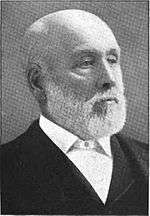Seth Lewelling
| Seth Lewelling | |
|---|---|
 | |
| Born |
1820 South Carolina[1] |
| Died |
February 21, 1896 (aged 75–76) Milwaukie, Oregon |
| Other names | Seth Luelling |
| Occupation | Orchardist |
| Known for | Developed the Bing cherry |
Seth Lewelling (1820 – February 21, 1896), alternatively spelled Luelling (including by Lewelling himself), was a pioneer orchardist from the U.S. state of Oregon, best known for developing the Bing cherry.[2] Born in 1820 in South Carolina[1] as Seth Luelling, he used that spelling of his last name for part of his life but at some point changed it to Lewelling and favored that spelling for the last several years of his life.
His brother Henderson Luelling (who retained the original spelling of his family's name throughout his life) came to Oregon from Iowa in 1847, bringing fruit trees in his wagon.[2] He established an orchard in Milwaukie, and Seth and their brother John came to Oregon and joined the business in 1847.[2] Seth became the sole owner of the business in 1857 and developed many new varieties of cherries, rhubarb, grapes, and golden prunes.[2] Among the cherries he developed were the Lincoln and the Black Republican.[2] As the names he gave to his cherries might indicate, Lewelling was also involved in the founding of the Oregon Republican Party.[2] In 1875, he developed the Bing cherry.[1]
Lewelling was also involved in Oregon's movement for Initiative and Referendum.[3]
He suffered a paralyzing stroke on July 1, 1895, and died at his home in Milwaukie on February 21, 1896.[1]
Legacy
Seth Lewelling is one of the 158 names of people important to Oregon's history that are painted in the House and Senate chambers of the Oregon State Capitol.[2] Lewelling's name is in the Senate chamber. Seth Lewelling Elementary School and the Lewelling neighborhood in Milwaukie are named for him.
See also
References
- 1 2 3 4 "A Noted Pioneer Gone". Oregon City Enterprise. February 21, 1896. p. 3.
- 1 2 3 4 5 6 7 Cogswell, Jr., Philip (1977). Capitol Names: Individuals Woven Into Oregon's History. Portland, Oregon: Oregon Historical Society. p. 13.
- ↑ The Initiative and Referendum and how Oregon got them , by Burton J. Hendrick